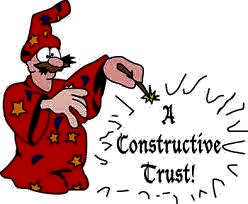Learn the Legal Principles Behind What Is A Constructive Trust and When It’s Used
Learn the Legal Principles Behind What Is A Constructive Trust and When It’s Used
Blog Article
Recognizing What Is a Positive Count On and Its Implications in Legal Issues
A useful count on is a nuanced legal principle made to deal with situations where building has actually been obtained under situations that warrant fair intervention. This remedy serves to prevent unjust enrichment and is specifically significant in instances involving fraud, violations of fiduciary responsibility, and family legislation conflicts. As we explore the foundational facets of useful trust funds, including their vital features and applications, one need to take into consideration the profound ramifications these trusts can carry property conflicts and ownership legal rights, raising essential concerns about justice and equity in lawful contexts.
Definition of Constructive Count On
A useful trust is a lawful solution that develops by procedure of law, rather than through specific agreement in between parties. It is commonly imposed by a court to attend to scenarios where one party has wrongfully gotten or holds property that rightfully belongs to an additional. The core principle underlying a constructive trust is the avoidance of unfair enrichment, making certain that people do not profit from their wrongful acts at the expense of an additional's rights.

Unlike share trusts, which are developed by the specific objective of the parties entailed, useful counts on develop from the scenarios and perform surrounding the home in question. This distinct nature highlights the fair considerations that courts must evaluate in determining the rightful ownership of property and making sure justice is served.
Key Characteristics
Useful counts on have a number of essential attributes that differentiate them from other types of residential or commercial property ownership and count on setups. Mainly, constructive depends on are not established by specific contract or formal affirmation; rather, they develop by procedure of legislation to resolve circumstances of unfair enrichment or wrongful conduct. This particular stresses their restorative nature, commonly carried out to guarantee justness and equity when one party holds residential or commercial property that, in justice, should come from one more.
Another remarkable facet is their concentrate on the connection between the events entailed, normally highlighting a fiduciary obligation or a breach of depend on (What Is A Constructive Trust). Useful counts on require a partnership that generates an obligation, such as that between partners or fiduciaries, reinforcing the honest responsibility to act in the very best interest of others
In addition, the building subject to a useful depend on is normally identifiable, as it needs to be details or deducible. This identification is crucial for ensuring and enforcing the trust fund that the hurt celebration can redeem their rightful interest. Constructive depends on can be used to various types of assets, including real estate and personal home, making them functional devices in dealing with lawful disputes.
Legal Applications
The application of positive rely on lawful contexts is broad and substantial, often serving as an important device for correcting oppressions in different scenarios. Useful trust funds are generally enforced by courts to attend to circumstances where one celebration has wrongfully profited at the cost of one more, thereby preventing unjust enrichment.
One primary lawful application is in cases of fraudulence or violation of fiduciary obligation. If a trustee misuses depend on possessions for individual gain, a court may enforce a useful count on to make certain that the properties are returned to the rightful recipients. This prevents the trustee from profiting from their misbehavior.
Additionally, positive counts on matter in household law, specifically in separation procedures. When one spouse has actually contributed to the acquisition of marriage residential or commercial property, however the title is exclusively in the other spouse's name, a court may develop a constructive count on to identify the non-titled partner's equitable interest.
Additionally, useful counts on can use in inheritance disputes, where a decedent's purposes are not shown in the formal will. In such instances, the court might enforce a useful depend recognize the decedent's real wishes. Overall, useful trusts play a vital duty in promoting justness and justice in various lawful matters.

Ramifications for Residential Property Disputes
Browsing building conflicts often entails the application of constructive depends on, which can provide equitable options in complex ownership circumstances. When parties are taken part in a dispute over building, the courts might enforce a constructive depend protect against unjustified enrichment and to guarantee that the home is held for the benefit of the rightful owner, even if legal title is in an additional's name.
Positive trusts are specifically relevant in situations where there is proof of an usual purpose to share residential property, such as in partnerships where one party contributes financially to an asset gotten in the other's name. This depend on offers as a remedy that acknowledges the payments made by one celebration and addresses possible discrepancies arising from the lawful titleholder's actions.
Furthermore, positive trusts can play a pivotal duty in resolving disagreements arising from fraud, misstatement, or breach of fiduciary responsibility, where one event wrongfully gets home at the cost of another. By enforcing a useful he has a good point count on, courts can recover equity and clear up ownership rights, ultimately facilitating reasonable end results and lowering the possibility of prolonged lawsuits. What Is A Constructive Trust. Therefore, useful counts on are crucial devices in the resolution of residential or commercial property disputes, promoting justice and integrity in possession issues
Just How to Establish a Constructive Trust Fund
Establishing a constructive trust fund needs showing certain elements that show the necessity for equitable alleviation. Primarily, a plaintiff must show that the accused holds building under circumstances that warrant a responsibility to convey it to the claimant. This commonly includes confirming that the home was gotten by the offender with wrongful conduct, such as fraud, violation of fiduciary responsibility, or unjust enrichment.
Moreover, it is important to establish a connection between the parties that sustains the imposition of a constructive depend on; this can consist of fiduciary relationships, joint ventures, or other collective collaborations. The complaintant must also demonstrate that they have a rightful claim to the home concerned, which usually requires supplying proof of their payment to the procurement or improvement of the residential property.
As soon as these aspects are developed, the court can impose a useful count on as a solution, thus enabling the claimant to recover the home or its value. Eventually, successful establishment of a useful depend on rests on clear proof of the wrongful conduct and the equitable principles that require such a trust, guaranteeing that justice prevails in property conflicts.
Final Thought
In conclusion, a useful trust serves as an essential legal system to remedy scenarios of wrongful home procurement and prevent unjust enrichment. By clarifying ownership civil liberties and providing treatments for hurt parties, useful trusts improve the stability of residential property legislation and guarantee that justice prevails in complex ownership situations.
As we discover the foundational elements of useful counts on, including their key features and applications, one have to consider the profound ramifications these trust funds can have on residential property disputes and ownership civil liberties, raising vital inquiries about justice and equity in lawful contexts. What Is A Constructive Trust.
Constructive trust funds have numerous vital attributes that distinguish them from other kinds of residential or commercial property ownership and depend on arrangements. Constructive depends on can be applied to various kinds of you can check here assets, consisting of real estate and individual building, making them versatile devices in attending to lawful conflicts.
If a trustee misuses depend on possessions for personal gain, a court might enforce a useful count on to ensure that the properties are returned to the rightful recipients.In final thought, a useful depend on serves as an essential lawful device to rectify scenarios of wrongful home purchase and prevent unjustified web link enrichment.
Report this page